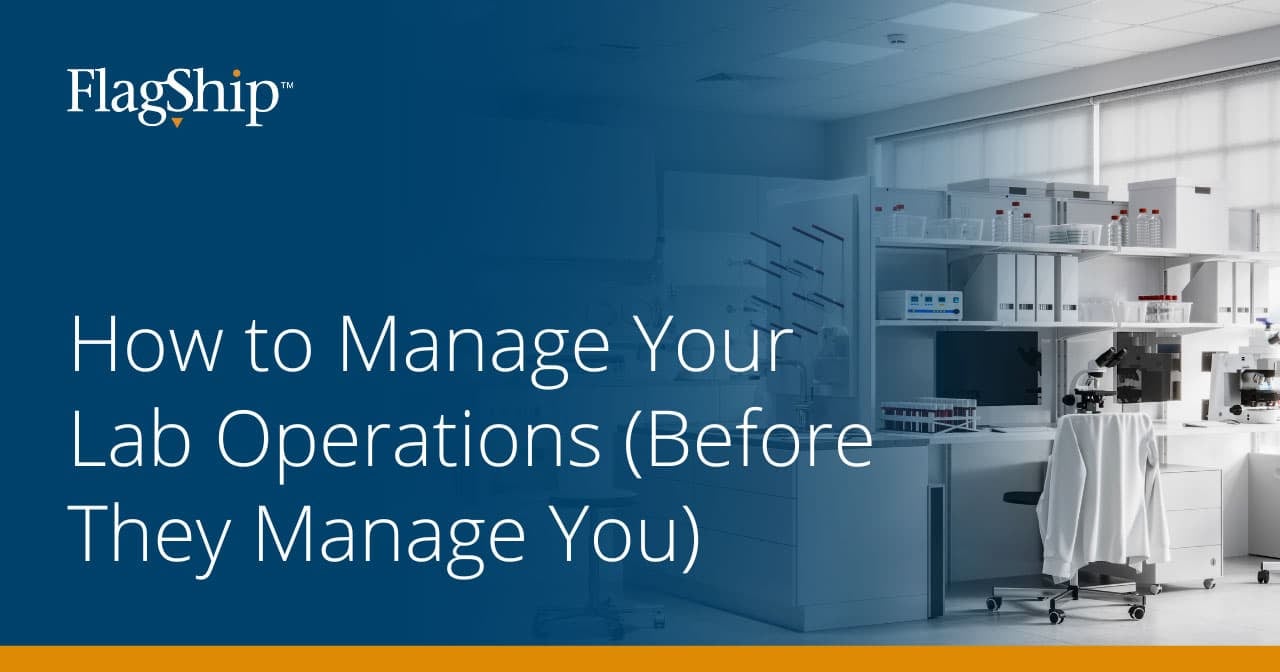
In this edition of "An Expert's P.O.V.", Flagship’s Lisa Manning, VP of Business Development for the Life Sciences, offers several tips for taking control of your lab operations.
Managing a lab can be an incredibly rewarding experience. You get to work with cutting-edge technology, collaborate with talented researchers, and push the boundaries of human knowledge.
However, lab management can also be incredibly challenging. There are countless moving parts that need tracking – from funding and staffing to equipment maintenance and experimental protocols.
When lab operations are managed effectively, the lab runs smoothly, and research projects are completed on time and within budget. But when lab operations are mismanaged, it can lead to delays, cost overruns, and your scientists spending too much time away from the bench.
If you're not careful, your lab operations will end up managing you, instead of the other way around. Here are some signs that you’re letting your lab operations manage you:
- You're constantly putting out fires. You find yourself reacting to problems and emergencies rather than preventing them.
- Your scientists spend more time preparing the lab than they do on the science.
In this blog post, we'll offer some tips for taking control of your lab operations, as related to inventory and equipment management and safety processes and procedures.
Inventory
The first step to inventory management is developing a process. Does everyone simply order what they need when they need it? How is inventory tracked once it’s ordered, received, and stocked? If the process isn’t clearly defined and followed, then you’ll end up with duplicate orders, high volumes of inventory sitting (and expiring) on the shelf, or worst case: a critical item going out of stock.
Whether you rely on an Excel spreadsheet or an inventory management tool, you need a well-defined inbound and outbound process for tracking inventory as well as a list of what and how much you want stocked. At the very least, create a spreadsheet to collect relevant information, including the name, supplier, location, and minimum stocked quantity for each product. (Chemical management should follow the same process, but you may need to gather a few extra details.)
Finally, you need to create a funnel so that orders are properly received (never duplicated), stocked in the proper location, and discoverable on demand.
Equipment
Once again, you should consider a process for ordering new equipment and servicing existing equipment. Is your lab equipment on a preventative maintenance (PM) service plan based on manufacturing specifications? Or do you find out a piece of equipment is broken when someone leaves a sticky note at your desk? Equipment (and its maintenance) is expensive, so your approach will greatly impact your bottom line.
At minimum, you should have a trackable list of lab assets detailing make, model, serial number, and last service date. Best case scenario, you use a lab equipment management system, which will give you a clear view of repair and service costs and help you budget as you grow.
Do you really need a service contract on a brand-new piece of equipment or a piece of equipment that hasn’t broken in 3 years? Insights from a lab equipment management system better equip you to project annual spend, plan for capital expenditures, and increase the life of your assets by maintaining a PM plan.
Safety
Lastly, it’s crucial that you define your safety processes and procedures, including guidelines on personal protective equipment, chemical handling, waste disposal, and emergency response. The key is to make sure that everyone who enters the lab has undergone the appropriate training at appropriate intervals. This will guarantee the safety of your team, increase productivity by preventing unnecessary downtime, and help you avoid unnecessary fines.
Remember – Implementing lab management processes is key to the success of your operations! Your processes should be designed to control time and costs, ensure the safety of your personnel, meet all regulatory requirements, and most importantly – maintain the accuracy and reliability of your research.
We’re thrilled to share that we’ve launched a new business unit specifically designed to meet the needs of early stage biotechs on both the east and west coast: Flagship Lab Services.
Building on the expertise gained through our 2021 acquisition of DENS in Cambridge, Massachusetts, our lab services teams will offer a comprehensive portfolio of laboratory services tailored to meet the specific requirements of early-stage biotech startups as they progress from R&D through GxP.





Leave a Comment